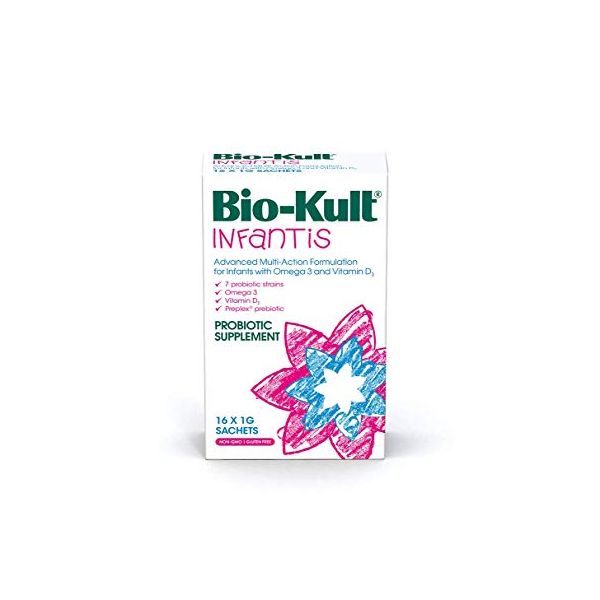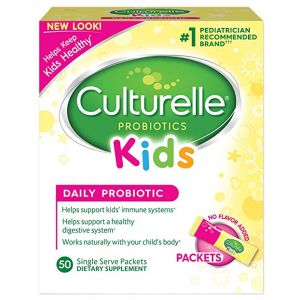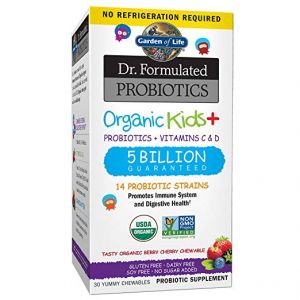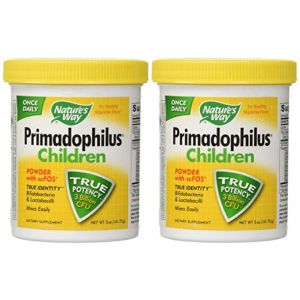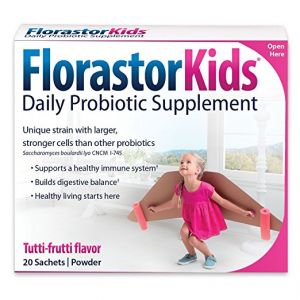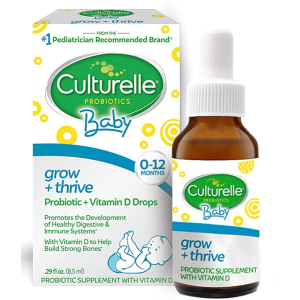- Pros:
- Improves digestive and immune system health
- Supports growth and development
- Sugar-free
- Gluten-free
- Non-GMO
- Taste-free
- Preservative free
- Easy-to-use packets
- Packets individually wrapped to enhance stability of the probiotics
- Fortified with prebiotics
- Protected probiotic strains that survive the high acidity of stomach acid
- No artificial colors
- Can be taken with antibiotics
- Travel-friendly
- No refirgeration required
Ingredients Concern: None discovered
Cons: Contains fish oil from tuna as well as milk and soy, all of which are allergens that may affect people who are intolerant to them, Probiotics may cause stomach discomfort in some infants and children.
The Lactobacillus and Bifidobacterium strains are most commonly used for digestive and immune support, followed by other strains such as Streptococcus [6].
Supplementing the diet with probiotics during pregnancy and early infancy improves immunity and the body's response to allergens [7, 8]. The benefits of early supplementation last for several years [7].
Probiotics, especially Lactobacillus and Bifidobacterium, are frequently used for diarrhea that is linked to the use of antibiotics [9]. In addition, hospitals often co-administer probiotics with antibiotics to shorten the duration of diarrhea [10, 11].
Oligosaccharides are commonly used prebiotics that provide nourishment for probiotics as this helps them grow and thrive [12].
Research has consistently demonstrated the importance of vitamin D for the development and growth of strong bones as well as enhanced immunity [4, 13].
Healthy levels of omega 3 fatty acids (DHA and EPA) support cognitive functions such as memory, focus, motivation, etc., and enhanced energy, while low omega 3 fatty acid levels are linked to mental fatigue [5, 14].
Enhanced Immunity [1, 2]; Digestive support [3]; Strong bones [4]; Brain health [5]
Probiotics play a key role in proper digestive function by maintaining a healthy balance of beneficial gut bacteria [3]. They also release enzymes the help digest food, different enzymes that target fungi, viruses, and bacteria, and additional substances that demonstrate antimicrobial activity [3, 15]. In doing so, they help target harmful invaders that would otherwise cause infections [16, 17]. Probiotics also improve digestive health, immunity, and overall health by improving the concentration of nutrients (e.g., vitamin C, calcium, iron, etc.) that are transported to the bloodstream [12, 18]. Accordingly, probiotic supplementation targets stomach problems that are typically related to indigestion such as gas, constipation, and diarrhea, the latter of which may occur due to antibiotics [9]. Probiotics are often recommended to individuals who take antibiotics to disrupt or reduce the duration of diarrhea [10].
Additionally, supplementation with probiotics that starts during pregnancy, continues during early infancy, and is incorporated into the regular diet during the first year of life, helps sustain digestive health, strong immunity, and decreased sensitivity to common allergens (e.g., pollen, cat and dog hair, etc.) for several years [8, 19].
Furthermore, there are vitamin D receptors on immune cells such as B cells, T cells, and antigen-presenting cells that allow vitamin D to help regulate immune responses [13].
In addition, omega-3 fatty acids have neuroprotective properties that protect brain cells from different types of damage [5, 14].
Key Ingredients: 2.5 mcg Vitamin D3 (Cholecalciferol); 1 billion CFU/g Lactobacillus casei PXN 37;Lactobacillus rhamnosus PXN 54; Streptococcus thermophilus PXN 66;Lactobacillus acidophilus PXN 35;Bifidobacterium breve PXN 25; Lactobacillus delbrueckii ssp. bulgaricus PXN 39; Bifidobacterium infantis PXN 27;Omega 3 fatty acids (> 1mg DHA and EPA from fish)
All Ingredients: 2.5 mcg Vitamin D3 (Cholecalciferol); 1 billion CFU/g Live bacterial cultures: Lactobacillus casei PXN 37;Lactobacillus rhamnosus PXN 54; Streptococcus thermophilus PXN 66;Lactobacillus acidophilus PXN 35;Bifidobacterium breve PXN 25;Lactobacillus delbrueckii ssp. bulgaricus PXN 39; and Bifidobacterium infantis PXN 27; Fructooligosaccharides; acacia gum; Omega 3 fatty acids (> 1mg DHA and EPA from fish)
Mix 1/2 - 1 sachet once a day with milk, water, or food (start with 1/4 of a sachet for babies who are younger than 6 months).
If you are still breastfeeding, some of the powder can be mixed with a little breastmilk, placed directly on the nipple before a feeding, or given directly into the infant's mouth.
Or dispense the probiotic as recommended by your doctor or healthcar+BH66e practitioner. Do not exceed recommended daily intake
These statements have not been evaluated by the FDA. These products are not intended to diagnose, treat, cure or prevent any disease.
References
1. Doron S, Snydman DR, Gorbach SL. Lactobacillus GG: bacteriology and clinical applications. Gastroenterol Clin North Am. 2005;34(3):483-498.
2. Rask C, Adlerberth I, Berggren A, Ahren IL, Wold AE. Differential effect on cell-mediated immunity in human volunteers after intake of different lactobacilli. Clin Exp Immunol. 2013;172(2):321-332.
3. Kechagia M, Basoulis D, et al. Health benefits of probiotics: a review. ISRN Nutr. 2013;2013:481651.
4. Laird E, Ward M, et al. Vitamin D and bone health: potential mechanisms. Nutrients. 2010;2(7):693-724.
5. Chang CY, Ke DS, Chen JY. Essential fatty acids and human brain. Acta neurologica Taiwanica. 2009;18(4):231-241.
6. Szajewska H, Konarska Z, Kolodziej M. Probiotic bacterial and fungal strains: claims with evidence. Dig Dis. 2016;34:251-259.
7. Kukkonen K, Savilahti E, Haahtela T, et al. Probiotics and prebiotic galacto-oligosaccharides in the disruption of allergic diseases: a randomized, double-blind, placebo-controlled trial. J Allergy Clin Immunol. 2007;119(1):192-198.
8. Kalliomäki M, Salminen S, Arvilommi H, Kero P, Koskinen P, Isolauri E. Probiotics in primary disruption of atopic disease: a randomised placebo-controlled trial. Lancet. 2001;357(9262):1076-1079.
9. Hempel S, Newberry SJ, Maher AR, et al. Probiotics for the disruption and treatment of antibiotic-associated diarrhea: a systematic review and meta-analysis. JAMA. 2012;307(18):1959-1969.
10. Ouwehand AC, DongLian C, Weijian X, et al. Probiotics reduce symptoms of antibiotic use in a hospital setting: a randomized dose response study. Vaccine. 2014;32(4):458-463.
11. Deshpande GC, Rao SC, Keil AD, Patole SK. Evidence-based guidelines for use of probiotics in preterm neonates. BMC Med. 2011;9:92.
12. Sheridan PO, Bindels LB, et al. Can prebiotics and probiotics improve therapeutic outcomes for undernourished individuals? Gut Microbes. 2014; 5(1):74-82.
13. Aranow C. Vitamin D and the immune system. J Investig Med. 2011;59(6):881-6.
14. Feller, S.E.; Gawrisch, K.; MacKerell, A.D., Jr. Polyunsaturated fatty acids in lipid bilayers: Intrinsic and environmental contributions to their unique physical properties. J. Am. Chem. Soc. 2002;124:318-326.
15. Manzoni P, Mostert M, Leonessa ML, et al. Oral supplementation with Lactobacillus casei subspecies rhamnosus disrupts enteric colonization by Candida species in preterm neonates: a randomized study. Clin Infect Dis. 2006;42(12):1735-1742.
16. Wang Y, Li X, et al. Probiotics for disruption and treatment of respiratory tract infections in children: A systematic review and meta-analysis of randomized controlled trials. Medicine (Baltimore). 2016;95(31):e4509.
17. Guillemard E, Tanguy J, Flavigny A, et al. Effects of consumption of a fermented dairy product containing the probiotic Lactobacillus casei DN-114 001 on common respiratory and gastrointestinal infections in shift workers in a randomized controlled trial. J Am Coll Nutr 2010; 29:455-468.
18. Gomes AC, de Sousa RG, Botelho PB, Gomes TL, Prada PO, Mota JF. The additional effects of a probiotic mix on abdominal adiposity and antioxidant Status: A double-blind, randomized trial. Obesity (Silver Spring, Md). 2017, 25(1):30-38.
19. Prescott SL, Dunstan JA, Hale J, et al. Clinical effects of probiotics are associated with increased interferon-gamma responses in very young children with atopic dermatitis. Clin Exp Allergy. 2005, 35(12):1557-1564.

